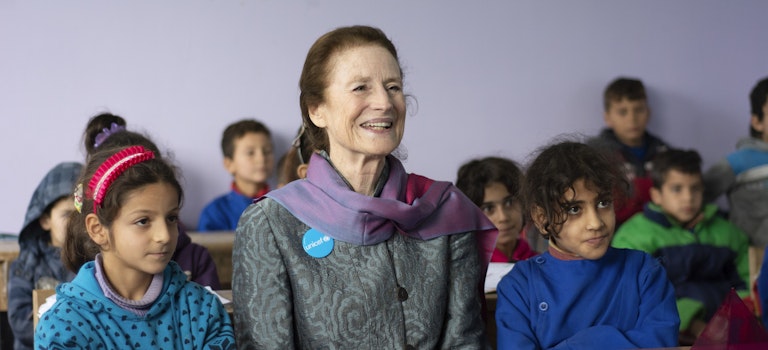An opinion piece by International Gender Champions Henrietta Fore.
Under the shadow of COVID-19, every aspect of our lives has changed — the way we work, teach and play has been upended.
But women and girls are shouldering a double burden made heavier by lingering inequalities and harmful gender stereotypes — inequalities exacerbated by the unprecedented containment measures put in place to limit infection.
More often than men and boys, women and girls under lockdown are juggling being teachers for their children, caregivers for the sick and elderly, and keepers of the household.
Single mothers in particular face unfair choices and risk losing their jobs if they take time off to care for their children during the pandemic.
Many women, and adolescent girls, are also experiencing increased violence in the home, locked in with abusive partners.
As seen in previous public health emergencies, the risk of sexual exploitation and abuse, particularly for women and girls, also significantly increases.
As we work through the pandemic, we have a golden opportunity to press the reset button on how people are treated depending on their gender and place the needs and rights of girls and women at the centre of everything we do.
For example, we’ve prioritized 5 key actions for gender equality in our COVID-19 response containing concrete, practical actions that governments, authorities and local leaders can take to support caregivers in homes and at work, end violence, maintain essential health and education services, and strengthen social protection systems.
For example, South Africa is taking steps to ensure uninterrupted access to social grants for women and children during the lockdown, so they can make ends meet during the crisis. UNICEF’s “Hajati” cash transfer programme in Jordan has also expanded to provide urgent support to vulnerable families that cannot count on savings to cope with the shock.
We also work with our sister agencies and partner organizations to provide hotlines, psychosocial and other services for girls and women who are survivors of violence. In many countries, for example, we use a pocket guide and app for front-line workers to support survivors of gender-based violence to disclose, receive information and services. Our #EndViolence campaign stresses bolder advocacy and collective actions to change people’s behaviors and attitudes.
UNICEF also requires that all of our humanitarian funding appeals include a commitment to addressing gender-based violence, including supporting front-line women’s networks and organizations in communities. Lifesaving support systems must never be left under-funded.
Even before the current crisis struck, UNICEF had established family-friendly policies that provide parental leave for male and female employees alike, and flexible work arrangements. This has enabled our staff to quickly adapt to virtual working under the COVID-19 pandemic, ensuring that our vital programming for children and women continues.
We joined forces with UN Women and the ILO to develop new guidance for employers to support employees leading to better outcomes for individuals and families.
We have also re-affirmed our UN-wide zero-tolerance policy for sexual exploitation and abuse of those we are mandated to serve, and for discrimination, sexual harassment, harassment and abuse of authority in the workplace. All staff must complete mandatory trainings and we continue to invest in strengthening reporting and accountability mechanisms internally and in the communities where we work.
We are building the size, skills, and diversity of our investigative staff. Staff must have trust in our systems to feel safe raising their voices to report instances of wrongdoing. They need to be confident their reports will be subject to swift, efficient and impartial investigation, judgment and, if necessary, discipline.
As part of our ongoing work to improve UNICEF’s organizational culture, we are working with our senior leaders to help them adapt their leadership approaches to a virtual workplace and reminding all staff that inappropriate behavior will not be tolerated in any UNICEF workplace, virtual or otherwise. We are committed to create a culture in which “speaking up” is encouraged – one the eliminates fear of retribution, and inspires confidence that the system works.
As we adapt to new ways of supporting women and girls under COVID-19 — in the communities in which we work and across our organization — we will continue to learn, adapt and grow together.
We hope others will be inspired by UNICEF’s commitment and journey, as we join forces to accelerate gender equality, support and protect women and girls. No matter who they are, no matter where they are.
Photo credits: © UNICEF/UN0264631
